
“If you are grateful, I will give you more ... “
(Surah Ibraheem, 14:7)
Most of us would like to show gratitude to our Creator and receive even more of His gifts, but in the hustle and bustle of daily life, it can be easy to forget this important act of worship. After all, sincere gratitude takes mindfulness. To do it properly, we need to slow down, calm our minds, put our worries aside, and really reflect on the many blessings our Lord has given us. How many of us manage to prioritize this each day? Although life is full of obligations and lengthy to-do lists, making gratitude a part of our daily routine can be an excellent way to ensure that we are showing enough thankfulness to the One who has given us everything.
What is gratitude, really?
“Gratitude is not the same as thankfulness,” writes Janice Marturano for Forbes. “Gratitude does not come as a response to something you have been given or earned. That is ‘being thankful.’ Gratitude is a much deeper way of living that comes from an awareness of being in the moment.”1
“It really is quite an amazing miracle that we are who we are, where we are, and doing what we are,” continues Marturano. “Gratitude is the deep feeling we get when we acknowledge that things are pretty amazing, and in response, we choose to meet our life with an open-heartedness and presence that comes from that recognition. A formal gratitude practice helps us cultivate those qualities and pay attention to the many sources of joy and peacefulness that are all around us, even when the day is chaotic.”
For Muslims, the concept of gratitude is even more meaningful. “When used in an Islamic context,” explains Dr. Tamer Desouky in his article The Art of Gratitude: Qur’anic Themes on Shukr, “the meaning of shukr extends well beyond general notions of gratitude and thankfulness as they’re used in contemporary society. Embodying shukr in its fullest sense is, in fact, a way of life that cultivates endless worldly and otherworldly rewards. The Quran and Sunnah are replete with reminders to express shukr. Ibn al-Qayyim went as far as saying that half of our entire belief (iman) rests on practicing it.”2
“Shukr is not simply an optional, supererogatory practice,” continues Dr. Desouky. “Rather, it is a fundamental obligation that sets the foundation for and encapsulates the essence of worship (Qur’an, 16:114; 2:172). So much so that Allah divides His creation based on those who express shukr and those who do not. Those who are ungrateful are ultimately labeled with disbelief (kufr), illustrating the magnitude of being ungrateful to Allah. Thus, knowing the signposts on the path of shukr and how to stay on it is essential to attain the mercy of Allah (4:147).”
Health Benefits
Gratitude also benefits our mental health, according to an article by Harvard Medical School. “In positive psychology research, gratitude is strongly and consistently associated with greater happiness. Gratitude helps people feel more positive emotions, relish good experiences, improve their health, deal with adversity, and build strong relationships.”3
An article in Psychology Today lists seven scientifically proven benefits of gratitude, including: opening the doors to more friendships, reducing toxic emotions and depression, promoting better sleep, enhancing empathy, improving self-esteem, relieving aches and pains, and building better mental strength and resilience.4
How do I begin a regular gratitude practice?
If you would like to make a commitment to enhancing your gratitude to Allah but don’t know where to start, there is a free online resource that can help. The Shukr Lifestyle: A Gratitude Journal is available and downloadable on the Yaqeen Institute website. This 15-day guide is a simple way to jumpstart your commitment to having a daily gratitude practice.
For each day, the journal provides a verse from the Quran that reminds us of the importance of gratitude and allows us to reflect on how crucial this aspect of our faith is. The activity section offers helpful prompts that encourage us to list things we are grateful for on that particular day. For instance, on Day One, we are encouraged to think of three blessings and connect these to some of the beautiful attributes of Allah. Day Two challenges us to think of our God-given intellect and faculties (eyes, ears, physical capabilities, etc.) and how we may or may not be using these to please our Creator.
Dedicating fifteen days to completing this journal will help build our gratitude muscle and might instill a habit that could become a lifetime commitment, inshaAllah. Knowing that shukr is the opposite of kufr really drives home the point that gratitude is essential to every Muslim’s life, both in the dunya (this life) and in the akhirah (Hereafter).
End Notes
1 How can a simple 2 step mindful gratitude practice change my life?
2 The Art of Gratitude: Qur’anic Themes on Shukr
3 Giving thanks can make you happier
4 7 Scientifically Proven Benefits of Gratitude
Laura El Alam is a freelance writer and editor and the author of the book Made From the Same Dough, as well as over 100 published articles. A wife and mother of five, Laura lives with her family in Massachusetts. You can visit her online at www.seaglasswritingandediting.com.



Add new comment